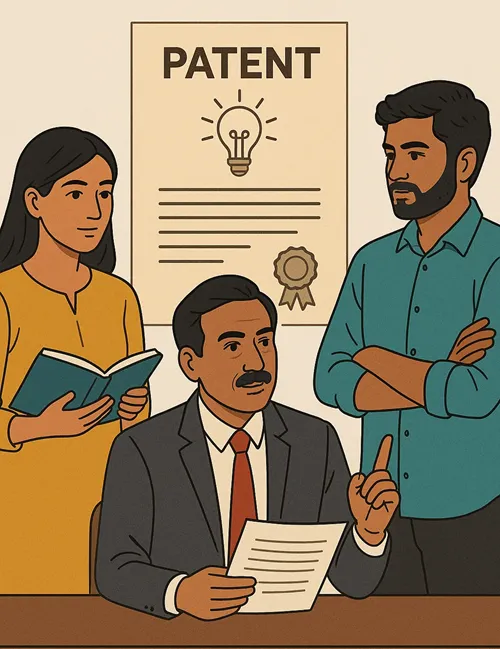
The Patents Act, 1970 is the law that protects inventors in India. It allows people who create new and useful inventions (like machines, medicines, tools, or processes) to legally own and control how their invention is used for 20 years. This means no one else can make, sell, or use the invention without the inventor’s permission during that time.
The invention must be:
- New (not already known or used)
- Useful (must do something practical)
- Non-obvious (not something easily guessed or copied)
Once a patent is granted, the inventor has full rights over it. After 20 years, the invention becomes public property, and anyone can use it.
How to Get a Patent – Simple 5-Step Process
-
1. Check if your invention is patentable
-
Make sure it is new, useful, and not already patented.
-
2. Write a detailed description
-
Prepare a document explaining what your invention is, how it works, and why it's new.
-
3. File a patent application
-
Submit it online or to the Indian Patent Office (you can file a provisional or complete application).
-
4. Wait for examination
-
The Patent Office will check if your invention meets all legal requirements. You may have to respond to queries.
-
5. Get the patent
-
If everything is in order, the patent is granted. You must pay annual fees to keep it active.
Patents Act, 1970 – FAQs
-
1. I made a new type of kitchen tool. Can I patent it?
-
Yes, if it's new and not obvious, you can apply for a patent.
-
2. Is software patentable in India?
-
Pure software is not patentable, but if it’s tied to a new machine or process, it might be.
-
3. I shared my idea with friends—can I still get a patent?
-
If it's already disclosed publicly, it may be stolen. Apply as soon as possible.
-
4. Can I sell my product before getting a patent?
-
You can, but it’s risky. It’s better to file a provisional patent application first.
-
5. How long is a patent valid?
-
20 years from the filing date, after which it enters the public domain.
-
6. Do I need to build a prototype before applying?
-
No, just explaining it in detail in the application is enough.
-
7. Can I patent a home remedy?
-
No, traditional or natural knowledge is not patentable.
-
8. Can a student apply for a patent?
-
Yes, age is not a limit. Even students can apply if they invented something new.
-
9. Do I need a lawyer to apply for a patent?
-
Not required, but it helps. You can apply yourself or through a registered patent agent.
-
10. How much does it cost to get a patent?
-
Government fees start from ₹1,600 (for individuals) + any legal/agent fees.
-
11. Can I apply for a patent online?
-
Yes, through the official Indian Patent Office website.
-
12. What happens after I apply?
-
Your application is published, examined, and then granted or rejected.
-
13. Can someone steal my idea during this process?
-
Once you apply, your idea is protected from the date of filing.
-
14. What if someone copies my invention after I get the patent?
-
You can take legal action and stop them.
-
15. Can I license or sell my patent?
-
Yes, patents are property—you can sell, transfer, or license them.
-
16. Can I apply for a patent in other countries?
-
Yes, but you must apply separately in each country or use international systems like PCT.
-
17. Will I get money just by getting a patent?
-
You need to find a buyer who wants to buy your patent.
-
18. Do I have to pay yearly fees to keep my patent?
-
Yes, renewal fees must be paid every year to maintain it.
-
19. What if I don’t pay the renewal fee?
-
Your patent will lapse, and you will lose your rights.
-
20. Can two people jointly own a patent?
-
Yes, individuals, partners, and companies all can own a patent. Patent is an IP which can be owned or traded like a physical asset.
Add new comment